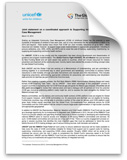2014
UNICEF, Global Fund and RMNCH Trust Fund Announce New Approach to Align Malaria and iCCM Planning
by Ray Chambers
UNICEF, The Global Fund and the RMNCH Trust Fund have announced a unified plan to support scale-up of integrated, community-based child survival in alignment with malaria activities.
Scaling up Integrated Community Case Management (iCCM) of childhood illness has the potential to save hundreds of thousands of children’s lives each year and is a key intervention for the achievement of MDG4 by 2015 and beyond. However, more resources are needed to support larger-scale implementation of community health workers delivering iCCM in appropriate geographies. UNICEF and the RMNCH Trust Fund are committed to helping mobilize funds towards iCCM, which includes helping to procure antibiotics, zinc, ORS, ACTs, and RDTs and to cover the cost of training, supervising, incentivizing and re-supplying community health workers.
For UNICEF, iCCM is an important priority in its work, and the organization has been providing guidance to implementers supporting child survival. The Global Fund to Fight HIV/AIDS, TB and Malaria has just launched its New Funding Model and will soon award new grants to countries, which will include resources for malaria prevention and treatment at the community level. Country teams have started the process of writing concept notes for new Global Fund funding.
Download a copy of the statement
UNICEF, the RMNCH Trust Fund, and the Global Fund issued a joint statement that commits them to working in a coordinated way to allow governments and beneficiary communities to achieve further reductions in child mortality through the iCCM approach.
Rather than creating a parallel process for malaria and iCCM funding, the Roll Back Malaria (RBM) Harmonization Working Group and newly formed iCCM Financing Task Team – led by UNICEF – have taken advantage of the New Funding Model preparation process to encourage countries to present their iCCM financial gaps alongside their malaria gaps. Countries are being encouraged to review their national plans, lead a dialogue with key iCCM partners, and to express their iCCM needs.
Only some components of iCCM are eligible for Global Fund support. Malaria commodities, service delivery and community health workers (CHW) platform costs are eligible; but commodities for pneumonia and diarrhea are not. Co-investments from additional donors for iCCM commodities and the CHW platform will be critical to ensure large-scale implementation in high-burden countries and appropriate geographies.
In addition to UNICEF, the Reproductive, Maternal, Newborn and Child Health (RMNCH) Trust Fund can be used as a leverage opportunity for co-investments in integrated care. Established in 2013, the aim of the RMNCH Trust Fund is to provide catalytic and gap-filling financial resources to assist countries in developing and implementing national RMNCH plans to improve access and utilization of life-saving RMNCH commodities and services, and this includes iCCM-related commodities and services.
UNICEF and the RMNCH Trust Fund will work jointly to ensure that additional resources will be made available to help cover the costs of iCCM commodities ineligible for Global Fund support and to support costs for training, supervising, incentivizing, and supporting CHWs where possible. Roughly US$50 million per annum over the next 3 years is expected to be mobilized to complement the Global Fund’s resources raised in its Fourth Replenishment. UNICEF and the RMNCH Trust Fund are committed to working with countries to ensure that the timing of any co-investments will support the timely delivery of integrated services.
NEWS UPDATE: On April 22nd, 2014 UNICEF and the Global Fund announced a formalization of their agreement to better coordinate efforts aimed at reducing the burden of HIV, tuberculosis and malaria and improving the health of mothers, newborns, and children. Specifically, the partners agreed to jointly identify countries where HIV and malaria investments for mothers and children could be better aligned with investments in basic maternal, newborn and child health. The Special Envoy’s Office fully supports this alignment and its vision of coordinating touch-points for improving and saving lives, wherever possible. Read more here.


